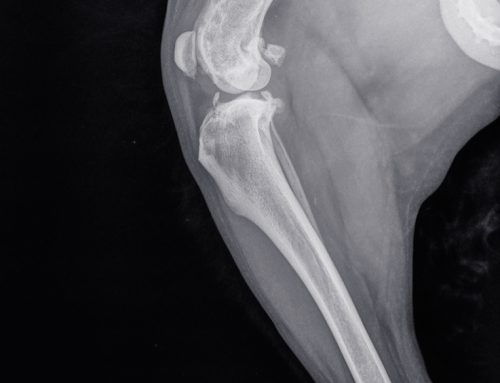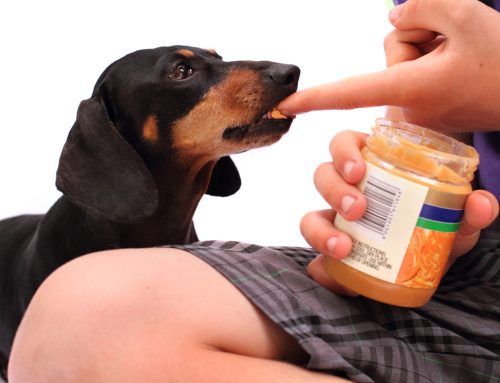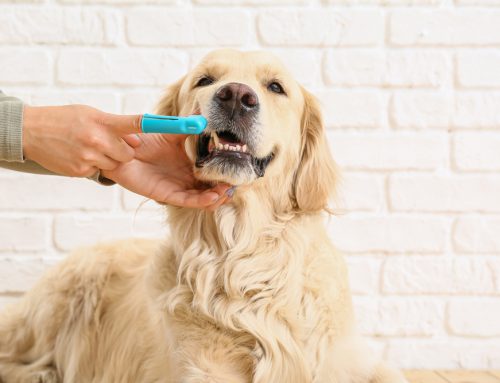Your pet’s health and well-being depends on you providing a pet-safe home environment. The Scripps Ranch Veterinary Hospital team has compiled a handy reference of common pet toxins, with links for further details, to help you pet-proof your home. National Pet Poison Prevention week is March 21 to 27, making this the perfect time to take a tour through your home and garden to see what potential dangers we can find.
Keeping the kitchen safe for your pet
To pet-proof your kitchen, consider childproof latches on your cupboards, and stow your trash can behind a secured door or cover it tightly with a lid. Be especially aware of preventing pet access to the following foods:
- Xylitol — Ingestion of xylitol-containing sugar free foods can cause a significant decrease in blood glucose levels, leading to seizures or liver failure.
- Chocolate— Toxicity signs from chocolate ingestion include tremors, seizures, and changes in heart rhythm. Dark chocolate and baking cocoa are the most dangerous.
- Raisins and grapes — Although some pets can eat grapes or raisins with minimal effect, others develop severe kidney damage after consuming small amounts.
- Onions, garlic, and chives — Members of the Allium family can cause life-threatening anemia, especially in cats.
- Bread dough —Painful gas, intestinal bloating, and alcohol poisoning can result from ingestion of uncooked and yeasty bread dough.
Avoiding bathroom dangers to your pet
In the bathroom, human medications pose the greatest danger to pets. Ingestion can initially cause vomiting or diarrhea, but may lead to more severe illness signs or organ damage. Human medications toxic to pets include:
- Non-steroidal anti-inflammatories (NSAIDs) — Naproxen, ibuprofen, and diclofenac are examples of non-steroidal anti-inflammatories (NSAIDs) that can cause severe gastric ulceration and kidney failure after accidental ingestion.
- Acetaminophen — This medication should never be given to cats because it leads to liver damage, and has a very narrow safety margin in dogs.
- Antidepressants — Accidental ingestion or overdose of these medications can affect your pet’s nervous system, leading to tremors and seizures.
- Attention deficit hyperactivity disorder (ADHD) medication — Hyperactivity, cardiac changes, and kidney damage can result from accidental ingestion by your pet.
- Cardiac medications — Cardiac medication ingestion can cause changes in your pet’s blood pressure and heart rhythm, and lead to kidney or liver damage.
- Vitamin D — Most vitamins are secreted in the urine, but an overdose of this fat-soluble vitamin can lead to kidney failure in your pet.
Safely storing your pet’s medications
Many veterinary products are manufactured in a tasty, chewable form for ease of administration. Ensure your pet does not receive a toxic overdose by keeping all pet medications tightly closed and out of reach. Over-the-counter topical flea and tick preventives containing pyrethrin or permethrin should be avoided in cats, nor applied to dogs who are around cats, because they can cause severe illness, seizures, or death.
Taking living room precautions for your pet
Try looking around your living room from your pet’s perspective, and keep candles, fragile or small items, and these potentially toxic hazards out of reach:
- Liquid potpourris and essential oils — Cats are especially sensitive to these products, which can cause liver failure if absorbed orally or through the skin.
- House plants — Pets like to chew on plants, so refer to this list of toxic plants to keep your pet safe from accidental ingestion.
- Flower arrangements — Beware of lilies, which are extremely toxic to cats. Drinking water from a vase, chewing on the plant or flower, or licking pollen from their paws can lead to sudden kidney failure.
- Marijuana — The degree of marijuana toxicity depends on the amount and type of product ingested, with potential side effects including a drop in their body temperature, seizures, or coma.
- Alcohol — Alcohol consumption by your pet can result in respiratory problems, seizures, weakness, or collapse.
Protecting your pet from outdoor hazards

If your pet goes outdoors, ensure they are microchipped, and your yard is securely fenced. In addition to avoiding potentially toxic plants in your yard, ensure all outdoor products, including the following, are inaccessible to your pet:
- Rodenticides and snail bait — Ingestion of small amounts of rat poison, or snail bait containing metaldehyde, are extremely toxic and can be life-threatening to your pet.
- Insecticides and fertilizers — Many of these products cause mild gastrointestinal signs, but ingestion of products containing organophosphates or metals can cause severe illness.
- Cocoa mulch — Cocoa mulch contains the same toxins as chocolate, but other pet-friendly mulch products are available.
- Antifreeze — Ethylene glycol in antifreeze is extremely toxic, and ingestion of small amounts can cause kidney damage.
Don’t hesitate to contact the Scripps Ranch Veterinary Hospital team, if you suspect your pet has ingested or been exposed to a toxin. After business hours, contact the ASPCA Animal Poison Control Center, Pet Poison Helpline, or a local emergency hospital.





Leave A Comment